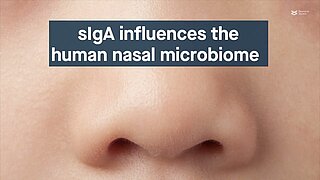Unique nasal microbiome
Study shows individual differences in the immune response of the nose. Researchers at the University of Tübingen provide new insights into the specific antibody response of endogenous immunoglobulin A. The results help to better understand the body's immune response.
A recent study published in the journal Microbiome sheds new light on the complex interplay between the human immune system and the microorganisms that colonize our nose. Local immune responses in the nose are very likely a critical factor in infections caused by respiratory pathogens. Nevertheless, this part of the immune system has remained largely unexplored. The study focused on the endogenous antibody secretory immunoglobulin A, or sIgA for short. Crucial to the body’s immune response because it is actively involved in neutralizing pathogens, sIgA is abundant in our nasal secretions, saliva, sweat, intestinal fluid, tears and breast milk.
Regulate the nasal microbiome to fight infections
One of the study’s focal points was to observe how sIgA and the bacterium Staphylococcus aureus interact. S. aureus is a bacterium that occurs naturally in the nose of many people and is initially harmless, but can develop into a pathogenic variant and cause infections. In particular, the reaction of the antibiotic-resistant variant MRSA, which is known as a superbug and feared for causing dangerous and difficult-to-treat infections, was a specific focus of the study. Interestingly, sIgA appears to have a specific interaction with a protein called SpA, which sits on the surface of S. aureus. This suggests potential new therapeutic approaches in which this interaction could potentially be manipulated to enhance the immune response or more effectively neutralize the pathogenic bacterium.
“We are beginning to understand the processes in our microbiomes better and better. The interactions of the antibody sIgA with the nasal microbiome give us a powerful demonstration of how these microbial systems regulate themselves – and could be regulated. We have huge potential here for future treatments,” says Rob van Dalen, a postdoctoral researcher in the Cluster of Excellence CMFI and first author of the study.
Nasal swabs from about 50 healthy individuals were analyzed. This showed that the amount of sIgA in the nasal mucosa has a direct influence on the number of bacteria living there. Individuals with higher levels of sIgA appear to be colonized by fewer bacteria, suggesting that this antibody plays a role in regulating the microbial population and thus also prevents the growth of harmful bacteria. Eventually, sIgA could be suitable for new treatment methods. But even though the results are promising, it could be a long time before such treatment methods are developed.
“We often talk about ‘bench to bedside’, that is, translating research results obtained at the laboratory bench into the hospital. But it is often a long way before this translation succeeds. This is where we need the right investors and partners who are willing to walk this path with us,” says study leader Andreas Peschel, Professor of Microbiology at the University of Tübingen and spokesperson of the Cluster of Excellence CMFI.
The research results now presented expand the understanding of how the immune system and the microbiome work together to improve human health.
Publication:
van Dalen R, Elsherbini AMA, Harms M, Alber S, Stemmler R, Peschel A. (2023). Secretory IgA impacts the microbiota density in the human nose. Microbiome 11(1):233, https://doi.org/10.1186/s40168-023-01675-y.
Prof. Dr. Andreas Peschel
University of Tübingen
Interfaculty Institute of Microbiology and Infection Medicine
Department of Infection Biology
Cluster of Excellence CMFI
andreas.peschel @
@ uni-tuebingen.
uni-tuebingen. de
de
Leon Kokkoliadis
Public Relations
Tel: +49 7071 29-74707
E-Mail: leon.kokkoliadis@uni-tuebingen.de
Related Articles

Deutschlandfunk Nova



The Conversation





